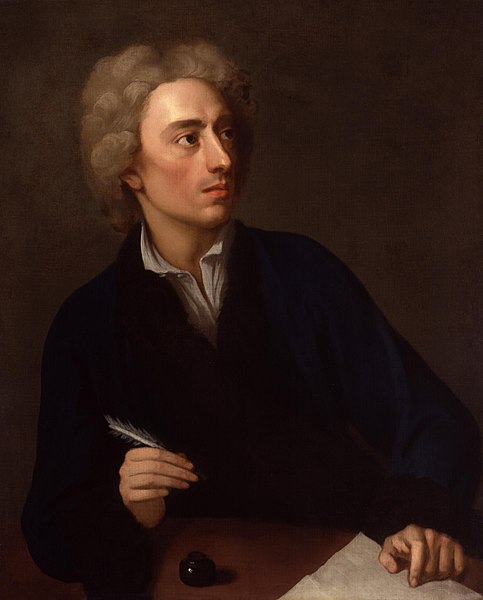[...]
But see! each Muse, in Leo's Golden Days,
Starts from her Trance, and trims her wither'd Bays!
Rome's ancient Genius, o'er its Ruins spread,
Shakes off the Dust, and rears his rev'rend Head!
Then Sculpture and her Sister-Arts revive;
Stones leap'd to Form, and Rocks began to live;
With sweeter Notes each rising Temple rung;
A Raphael painted, and a Vida sung!
Immortal Vida! on whose honour'd Brow
The Poet's Bays and Critick's Ivy grow:
Cremona now shall ever boast thy Name,
As next in Place to Mantua, next in Fame!
But soon by Impious Arms from Latium chas'd,
Their ancient Bounds the banish'd Muses past:
Thence Arts o'er all the Northern World advance,
But Critic Learning flourish'd most in France.
The Rules, a Nation born to serve, obeys,
And Boileau still in Right of Horace sways.
But we, brave Britons, Foreign Laws despis'd,
And kept unconquer'd and unciviliz'd,
Fierce for the Liberties of Wit, and bold,
We still defy'd the Romans as of old.
Yet some there were, among the sounder Few
Of those who less presum'd, and better knew,
Who durst assert the juster Ancient Cause,
And here restor'd Wit's Fundamental Laws.
Such was the Muse, whose Rules and Practice tell,
Nature's chief Master-piece is writing well.
But see! each Muse, in Leo's Golden Days,
Starts from her Trance, and trims her wither'd Bays!
Rome's ancient Genius, o'er its Ruins spread,
Shakes off the Dust, and rears his rev'rend Head!
Then Sculpture and her Sister-Arts revive;
Stones leap'd to Form, and Rocks began to live;
With sweeter Notes each rising Temple rung;
A Raphael painted, and a Vida sung!
Immortal Vida! on whose honour'd Brow
The Poet's Bays and Critick's Ivy grow:
Cremona now shall ever boast thy Name,
As next in Place to Mantua, next in Fame!
Starts from her Trance, and trims her wither'd Bays!
Rome's ancient Genius, o'er its Ruins spread,
Shakes off the Dust, and rears his rev'rend Head!
Then Sculpture and her Sister-Arts revive;
Stones leap'd to Form, and Rocks began to live;
With sweeter Notes each rising Temple rung;
A Raphael painted, and a Vida sung!
Immortal Vida! on whose honour'd Brow
The Poet's Bays and Critick's Ivy grow:
Cremona now shall ever boast thy Name,
As next in Place to Mantua, next in Fame!
But soon by Impious Arms from Latium chas'd,
Their ancient Bounds the banish'd Muses past:
Thence Arts o'er all the Northern World advance,
But Critic Learning flourish'd most in France.
The Rules, a Nation born to serve, obeys,
And Boileau still in Right of Horace sways.
But we, brave Britons, Foreign Laws despis'd,
And kept unconquer'd and unciviliz'd,
Fierce for the Liberties of Wit, and bold,
We still defy'd the Romans as of old.
Yet some there were, among the sounder Few
Of those who less presum'd, and better knew,
Who durst assert the juster Ancient Cause,
And here restor'd Wit's Fundamental Laws.
Such was the Muse, whose Rules and Practice tell,
Nature's chief Master-piece is writing well.
Their ancient Bounds the banish'd Muses past:
Thence Arts o'er all the Northern World advance,
But Critic Learning flourish'd most in France.
The Rules, a Nation born to serve, obeys,
And Boileau still in Right of Horace sways.
But we, brave Britons, Foreign Laws despis'd,
And kept unconquer'd and unciviliz'd,
Fierce for the Liberties of Wit, and bold,
We still defy'd the Romans as of old.
Yet some there were, among the sounder Few
Of those who less presum'd, and better knew,
Who durst assert the juster Ancient Cause,
And here restor'd Wit's Fundamental Laws.
Such was the Muse, whose Rules and Practice tell,
Nature's chief Master-piece is writing well.

Alexander Pope
By Michael
Dahl (studio of)
Oil on
Canvas
London,
National Portrait Gallery
Aucun commentaire:
Enregistrer un commentaire